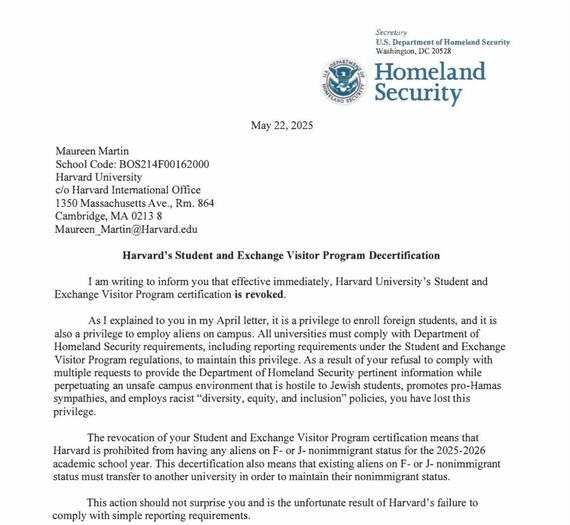Tensions between the Trump administration and Harvard University escalated sharply as the U.S. Department of Homeland Security (DHS) abruptly revoked Harvard's certification under the Student and Exchange Visitor Program (SEVP) on Thursday.
The move bars the university from enrolling international students and requires current international students to transfer to other institutions, or they will risk losing their legal status in the U.S.
This ban has sparked global attention and cast a shadow over the academic futures of thousands of international students: now, where do they go?

The U.S. Department of Homeland Security abruptly revokes Harvard's certification under the Student and Exchange Visitor Program (SEVP) on May 22, 2025.(Photo from Secretary Kristi Noem's post on X)
Why did the U.S. government target Harvard?
This action is not without precedent. Tensions between the Trump administration and elite American universities have been building for years.
Since returning to the White House, President Donald Trump has repeatedly attacked U.S. universities as strongholds of leftist ideology. Earlier, the administration had already suspended federal funding for over 60 universities, including Harvard.
Since March, the government has ordered Harvard to shut down its "Diversity, Equity, and Inclusion" programs and reduce administrative power. After Harvard refused to comply, the government froze $2.2 billion in federal funding and $60 million in contracts.
The latest step—revoking SEVP certification—was justified by DHS on the grounds that Harvard had tolerated antisemitism and refused to cooperate with investigations, pushing the standoff to a breaking point.
The government also demanded that Harvard submit records of international student protest activities over the past five years within 72 hours — or they would face permanent disqualification from enrolling international students. Harvard has denounced the action as illegal, but international students now face an urgent transfer deadline or risk losing their visa status.
Thousands of international students at risk
The fallout of this ban on Harvard is immense. Harvard has 6,793 international students (27.2% of its total), according to the university's admissions data. Many are on F-1 or J-1 visas and now have only a few weeks to find a new school or risk deportation.
International students are key to Harvard's labs and research. Their sudden exit could stop important projects. Graduate students and PhDs may face serious academic delays.
Foreign researchers with J visas are also affected. Many research teams could fall apart.
This represents not only a loss of student enrollment and financial revenue for Harvard, but also a major crisis for its global reputation.
Moves pose threats to the openness and diversity of American higher education
On Thursday, DHS Secretary Kristi Noem stated on Fox News that other universities could also be investigated, calling the move a warning to colleges across the country.
If the scope of the ban expands, international students at these institutions may also face forced transfers or legal status issues, posing a serious threat to the openness and diversity of American higher education.
When a university loses the right to choose from the world's brightest minds, what America loses is its future, said Former Harvard President Lawrence Summers. This warning seems to reveal the ultimate consequence of this blacklisting.
For international students, the only option now is to assess the situation carefully: as policy uncertainty becomes the new norm, having a diversified education plan is no longer advisable but essential.


